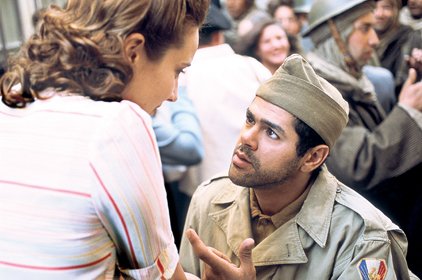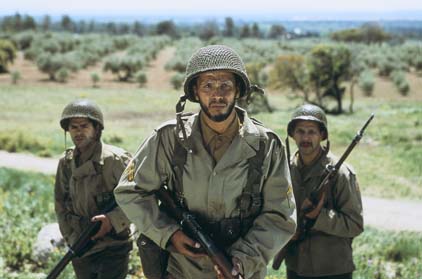LITTLE ROCK — A cri de couer dressed out as a standard war film, Days of Glory is a well-made if blunt appeal for justice for the nearly forgotten Algerian soldiers who enlisted in the French Army in 1943. These soldiers played an important role in the liberation of France in World War II, as French troops augmented and often preceded by North Africans drove through Italy, Provence and into Alsace.
Yet despite their service for a "motherland" many of them had never seen before the war, the pensions of these soldiers were suspended in 1959 when the French colony sought independence. While the pensions were restored in 2001, no funds were allocated to these troops or their families until last year, after this film was screened for French President Jaques Chirac.
Movie
Days of Glory
<strong>Grade:</strong> B+ <br /><strong>Cast:</strong> Jamel Debbouze, Samy Naceri, Roschdy Zem, Sami Bouajila, Bernard Blancan <br /><strong>Director:</strong> Rachid Bouchareb <br /><strong>Rating: </strong>R for war violence and brief language. <em>Subtitled</em>
Days of Glory (the French title, Indigenes, which translates as "natives" or "indigenous people," is more fitting and evocative) focuses on a handful of these Algerians, real soldiers whose experiences we are to take as representative of their class. There's Said (Jamel Debbouze, a comic actor best known in this country for his portrayal of the sweet, naive butcher in Amelie), a poor kid who joins up over his mother's protests to escape the poverty of his desert village.
Messaoud (Roschdy Zem) is a romantic who falls in love with a grateful French woman after her village is liberated. While Messaoud's passion is requited, the French censors intercept all correspondence between the two after his platoon pushes on.
Abdelkader (Sami Bouajila) is a tough Berber from the mountains who resents his French commanders and chafes at the second-class citizenship afforded Muslims in the French army. (The Algerians aren't even given the same quality rations as their French counterparts; they are consistently overlooked for promotion and assigned the most dangerous and arduous duties.)
Yassir (Samy Naceri) is a dutiful pragmatist determined to stay with the program despite the obvious inequalities - he means to win the trust and respect of the French by being a model soldier, a position that opens him to charges of Uncle Tomism from his Algerian cohorts.
Their sergeant, Martinez (Bernard Blancan), is a conflicted Frenchman - a pied noir, a mixed-race French citizen born in Morocco to a Muslim woman - who cares for his men while loathing (and hiding) the African partof himself. He takes the childlike Said under his wing, shielding him when he can, but ultimately lashing out at what he perceives as his inherent weakness - Said's "nativeness."
Director Rachid Bouchareb, of Algerian descent, follows a fairly conventional path in tracing these pilgrims' progress - it's difficult not to notice a similarity between the houseto-house fighting and the finale of this movie and Steven Spielberg's Saving Private Ryan. Bouchareb's script, written with Olivier Morelle, uses the names of real people, which raises the question of how much of the film is pure invention and how much is based on fact.
This probably won't rise to the level of a problem for most moviegoers, but the revelation that men with these names actually fought and, in some cases, died in this campaign is somewhat disconcerting. There's a difference between using fiction to tell the truth and subverting history - even if it's only the history of an individual.
Still, there's an undeniable power to the film derived mainly from the solid performances of the lead actors - who were collectively honored with the "best actor" award at the Cannes Film Festival - that raises Days of Glory above the level of a didactic civics lesson with cannon fire. While less subtle and more derivative than one might expect from a film nominated for a best foreign language Oscar, the political efficacy of the film is undeniable. It is a film that took on a moral inequity and righted it.
Still, it could have been more original and less obvious; Bouchareb might have delved a little deeper into the psychology behind the apparently genuine loyalty these soldiers felt to La France. Did they all aspire to be European? Or was their service more mercenary; did they hope to win something more than France for the French?
MovieStyle, Pages 45 on 04/06/2007

